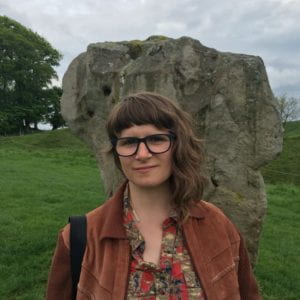Writing As Paying Attention: An Interview with MC Hyland

By Parmis Parsa
MC Hyland is a poet, scholar, publisher, professor, and public artist. Having published two-full-length books of poems: “THE END” (Sidebrow 2019) and Neveragainland (Lowbrow Press 2010), as well as being a founding editor at DoubleCross Press, she is already proving herself a noteworthy critic and artist. I had the opportunity to take a class called Reading as a Writer with her at New York University, which has been one of the most enjoyable college classes I have taken to date. Being or aspiring to be a writer in the 21st century is not easy, but when we see success stories like Hyland’s—poets who are capitalizing on their positions as both artist and teacher—we begin to view this endeavor as less daunting and more inspiring. I conducted this interview over email.
Could you describe what it feels like to work on a creative project that is close to your heart, or your writing in general, and finally have it shared with the public? How do you begin to form themes from small pieces you’ve worked on; when does the full picture start taking shape? And once the final product is produced, how do you respond to the critical reception received from it?
So I think there are two parts to this question: one about writing and one about publishing. As a writer, I’m a poet who works at the unit of the group of poems. I hardly ever sit down, feel inspired, and write a single poem. Honestly, I know there are writers for whom “inspiration” is a thing, but for me, writing is more like a muscle–I have to keep it in shape, and I do that by working on projects. I tend to come up with an idea of how I’ll write something long before I know what it’s about, and I also tend to write long projects that take a few years to complete. When I was younger, I didn’t understand that was my pace–it was a huge relief once I realized I didn’t have to be stressed about finding a new inspiration every week, that I could just give myself an assignment and go from there. So, for example, my book “THE END,” which came out this past summer, was a project where I wrote 100 poems, all of which were called “THE END,” and all of which were composed of sentences with similar syntax. I told myself, at the beginning, that I’d write a hundred of these poems, and as I was working on the project, I often told myself that my job was just to write short sentences (on my phone or in notebooks or sometimes on my computer), and not to think about how they went together until later. Once I had a page’s worth of sentences, I’d sit down and assemble them into a paragraph, and move them around until I liked the ways they were talking with one another. Sometimes that editing process made individual sentences mean different things than I’d first intended–I always find it really exciting when a piece of writing opens up in that way. Because that project was about hitting a target (100 poems, each at least a half-page long), I could think about form and about process, rather than about content, and that helped me write about a lot of subjects that would have been harder to come at head-on.

